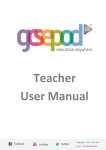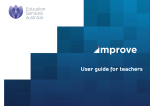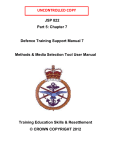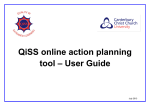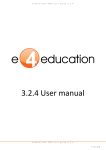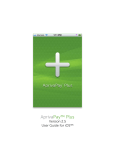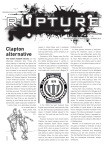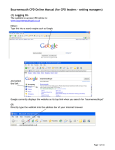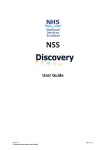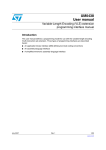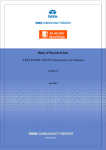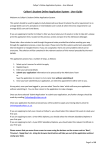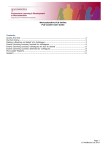Download Assignments - Squarespace
Transcript
Provided by The London Borough of Tower Hamlets Teacher User Manual 1 What’s new for GCSEPod 2.0? 2 Why use GCSEPod? 3 Getting started 4 Setting subject exam boards 5 Groups and monitoring usage 6 Resetting student passwords 8 My GCSEs 9 Assignments 11 Extras 15 Playlists 18 Sharing and deep linking podcasts 20 Downloading podcasts to Apple devices 21 Downloading podcasts to Android/Blackberry devices 25 1 What’s new for GCSEPod 2.0? We’ve taken our successful GCSEPod service, completely revamped its look and feel and added brand new content. Some of the new features include: More content 700 NEW science, PE and D&T Resistant Materials podcasts with our iconic infographic style, with more topics and subjects on the way Increased system integration Single sign on functionality for most VLEs: students are automatically logged in to GCSEPod when using the school VLE Optional data import from MIS for improved reporting, assessment and assignment setting A new GCSEPod app that seamlessly synchronises with the GCSEPod website. Student and staff usage on the app is also in overallmonitor usage statistics recorded Set assignments, progress and differentiate by creating questions targeted to student needs New teacher dashboard New student dashboard Teachers add their own resources (videos, images, quizzes, past papers) for richer learning experiences Create playlists and send these to individuals or groups. Set exam specific revision, a weekend’s homework or work for a long term absent student Create reports to evaluate impact by cohort, gender, pupil premium allocation… Create bespoke playlists of content ready to view and learn offline at any time Includes viewing history, favouriting and sharing options Filters podcasts relevant to their subject and exam content Responsive website Website auto-adjusts for any screen size (phone, tablet, PC, Whiteboard) when watching live or offline Brand new Apple app A new GCSEPod app that seamlessly synchronises with the GCSEPod website. Usage on the app is also recorded in overall usage statistics 1 Teachers - Why use GCSEPod? It’s convenient and effective In 2012, GCSEPod subscribing schools achieved an average rise in attainment of 2.6% (percentage of students with at least 5 A*-C grades including English and Maths). That’s 3% higher than the national average. Many subscribing schools achieve a rise of more than 10% year on year. GCSEPod podcasts are designed for mobile devices so it’s like your students carrying a huge pile of textbooks and revision guides around with them everywhere. Filters also ensure that your students can only view the podcasts relevant to the exam boards you use. It will help you organise your students’ learning Create personal podcast playlists to send to students in the run-up to a test or set homework for them to complete. Add extra resources to a podcast (quizzes, videos, images, past papers) to support the students further. Single sign on available through your VLE so there is a seamless transition to GCSEPod from your school’s online learning environment. 75% of 16-24 year olds own a smartphone* Make use of existing and new mobile technology in your school. Podcasts can be watched online in school, at home or downloaded to Apple, Android and Blackberry devices. Students can listen to GCSEPod podcasts anywhere, with nobody knowing that they are working. *(Ofcom 2013) 3 Teacher Quick Start Guide What is it? Over 3,500 audio-visual podcasts Content produced specifically for mobile devices, tablets and PCs Designed to squeeze exactly the right knowledge students need for exam success into short 3-5 minutes chunks Helps with setting homework tasks, targeting specific students or groups of students. How do I get it? The London Borough of Tower Hamlets Virtual School will provide you with a unique username and password. 1) Go to www.gcsepod.com 2) Click ‘Log in’ 3) Enter your username and password Key Features Assignments Groups Add questions to specific podcasts to test your students’ understanding of the subject. Organises your students into different groups and sorts by key data (e.g. amount of usage, number of logins). Compare usage between different groups (e.g. male/female split, SEN students, Pupil Premium) to evaluate impact. Allocate them to groups of students or target one specific student to support. Results are available as reports to track progress. Extras Reports Attach extra resources to a podcast to give students further knowledge and revision guidance. Evidence the impact of GCSEPod to OFSTED using the detailed usage reports. Monitor site usage, compare with exam results and print related assignment reports to keep track of student progress. Videos, images, past papers, quizzes and web links can be added to enhance learning. 3 4 Changing your password How to change your password Click My Account in the top menu bar. Enter your new password twice and click Save 9 Setting Exam Boards Setting exam boards It’s important to select the exam boards your school uses for each subject area on GCSEPod as this will filter the podcasts for the students and ensure that they only see podcasts relevant to the exam board your school uses. When you first login, you will be prompted to set the exam boards for all subject areas. Any teacher can set exam boards for any subjects; however, we recommend that if you are the Exam Coordinator you set the exams for the whole school. Once the exam boards are set, this will limit the podcasts shown to staff and students to only those that are relevant. Exam Boards On your dashboard, click> Set your subject exam boards You will see a list of all the subjects. Click the plus button and then choose the exam board for that subject. Selecting your exam boards Click the subject name to see the list of exam boards Don’t forget to Save Click the exam board logo. Once it has been selected the logo will turn from grey to coloured. Viewing and Creating Groups What is a group? The Groups tab allows teachers to view and create groups containing students or teachers. This could be used for differentiation purposes, to target certain groups of students, or even one particular student who was struggling. Once the Group has been saved, that group will be available to select when you are setting assignments or creating reports. When you view a Group you can customise the information you see by selecting from a list of data including last login date, number of podcasts downloaded and more. Different Types of Groups Click> Groups along the top menu bar. You will see a list of all the groups. You may see some groups that say: “Imported Group.” These are groups that have been imported from your school MIS system. You can view these groups but cannot delete or edit them. Click Viewing a group Click here to add more columns of information Click here to create a new user. They will be automatically registered so they can login immediately. Click here to view detailed information about the user’s usage of GCSEPod Viewing and Creating Groups Viewing individual students in the group Click here to download individual data Creating a new Group To add a group, click > Create a Group If you want to import a list of students/teachers via an Excel spread sheet into the group, you can do so by clicking the “Import as CSV” button. Detailed information on how to setup your Excel spread sheet is available when you click the “Import as CSV” button. Any users you import which are not already registered with GCSEPod, will be automatically registered. Alternatively, you can add users to the group one-by-one by searching for their names here. Resetting Passwords Resetting passwords Students will be asked to set a password reminder when they choose their username and password for the first time. If they forget their password we recommend that, as a first step, they select the “Forgotten your login details?” button on the login screen. There they can enter their name and date of birth and will be shown their username and password reminder. However, if they still cannot remember their password, you can reset it for them. Resetting a student’s password To reset a student’s password, go to the Teacher Area on the dashboard and click Manage Groups. You will see a list of all the groups created and imported Choose a group that you know the student is a member of and click >View Group Find the student in the list and click > view Click >reset password 8 My GCSEs My GCSEs The My GCSEs area on the site is where you can view a list of upcoming examinations and find out which podcasts are relevant to those exams. This tool can be used to help you identify podcasts that are relevant to the exam board and exam spec that your department is using. You can then watch the podcast playlist or download the individual podcasts to your mobile. Note: the playlists may not contain information about all the topics in the exam. Searching for your GCSE exams Click My GCSEs on your dashboard. Here you can view upcoming exams by subject area. You can see the date of the exam. You can still view exam playlists even if the exam date has not been set. If more than one exam board logo appears, you can deselect exam boards to remove those exams from your list. Click view playlist to watch all the podcasts relevant to that exam. 9 My GCSEs Viewing the GCSE playlist Click here to add a chapter to your favourites playlist Click here to download one chapter 10 Assignments What is an assignment? An assignment allows you to identify podcasts that you wish your students to watch and then set this as a task for the students to complete. You can also add auto-marking questions to help the students test their knowledge and help you to identify knowledge gaps for an individual or within a group. Use the assignment feature to set homework, help students organise their revision or as an end of lesson task. How to create an assignment Click the assignments tab or quick link. Here you will see all your published or draft assignments and reports attached to them. You can choose whether to create a new assignment, duplicate an existing assignment or view and copy another teacher’s assignment. Click create an assignment. Personalise your assignment Give the assignment a name and a description You can then add instructions for the students Add a deadline for students to work towards 11 Assignments Select the podcasts Click next: select chapters Add the chapters that you would like the students to listen to by clicking the Department > Subject >Topic >Title >Chapter and then add the chapter or chapters. Once the chapters are selected you can re-order or delete them. Delete Re-order Add your questions Click next: questions You have a choice of multiple choice or free text questions. Multiple choice questions are auto-marked so if you want students to receive instant feedback, choose this option. Free text questions need to be reviewed by you and marked separately, giving you the opportunity to provide the student with valuable feedback. You can save and quit at any time – this will create a draft assignment that you can return to later. 12 Assignments Free text questions Choose free text Delete or arrange questions here Type your question Add another question Multiple choice questions Choose multiple choice Type your question Add your answer options Select the correct answer here Don’t forget to select the correct answer for any multiple choice questions Assigning to groups Click next: assign groups If your school has chosen to integrate GCSEPod with your school MIS then your MIS groups will be shown here. If not, you can easily create your own groups and then set the assignment. Groups Click to create a new group, for example “gifted and talented” or “after school maths class”. 13 Assignments Preview and publish Now you can preview the assignment. Once you have previewed the assignment you can save and quit for later or publish and assign to the students in the group. When you are ready to view the results and mark any free text questions you have added, you will see a view report button on the assignment. This will take you to the reports section. Marking the assignment and viewing your assignment report Click view answers to view the answers the students gave to multiple choice questions. If you have set free text questions, click “requires marking” to mark this. You can see a summary of the assignment, including the average score and which question the students struggled with the most. 14 Assignments Duplicating Assignments Now you can duplicate both your past assignments and other teacher’s assignments. Click the assignments tab or quick link. Here you can choose whether to duplicate an existing assignment or view and copy other teachers’ assignments. Duplicating Existing Assignments To search for an assignment to duplicate you can search by teacher name, group name, tag or unique assignment code. You can also choose to duplicate one of your existing assignments from a drop down list under the title “My Assignments”. Then simply click preview or duplicate depending on whether you want to view or copy the assignment. 15 Assignments Duplicating Other Teachers’ Assignments You can duplicate other teachers’ assignments by clicking on the drop down list entitled “Other Teachers’ Assignments”. You will see a list of all subjects. Pick a subject and all the available assignments for that subject will be visible. Then simply click preview or duplicate depending on whether you want to view or copy the assignment. When you choose to duplicate an assignment you will go straight to the assignment preview page. Use the edit buttons beside each section of the assignment if you want to make changes. Please note that you must assign this to “all pupils” or at least one group to publish successfully. The assignment due date will be set. You can change this in the “Title” section. Once you are ready, click publish and assign at the bottom of this page to set the assignment. 16 Teachers - Extras What is an extra? Extras are additional resources which you may want your students to have access to, alongside the GCSEPod podcasts. Perhaps you have a video on your VLE of a science experiment and you want to add it beside the relevant podcast. Or, you might want to add a link to a useful website. Extras can be videos, images, quizzes, past papers or useful web-links and, once published, the extras will appear next to the associated podcast for all students and teachers in your school. To adhere to copyright regulations, please note that you cannot upload files (e.g. video, images) as Extras. Instead you can copy and paste the link or embed code for a resource that is hosted on another website (e.g. your VLE/YouTube). How to create an Extra Click the extras tab or quick link. Here you will see all your published or draft extras. Published means that you have allocated it to a podcast. You can edit extras even when they have been published. Click create extra. Personalise your extra Select the Department > Subject>Topic>Title to choose the podcast you want the extra to appear beside or use the search bar if you know the name of the title. Click assign extras 15 Teachers - Extras Select your content Tick the relevant box(es) to choose what type of extra(s) you want to add. You can copy the web-link to a past papers You can embed the video code or use the web-link You can copy the web-link to an image You can copy the web-link to a useful website Quizzes are simple multiple choice questions and are automarked Note: Student quiz results are not recorded or visible in the reports section at this time. If you would like to test a student’s knowledge of a subject, we suggest setting an assignment. Add your content Click link to add link (and embed for embedding a video) Skip here if you don’t want to add anything Save and quit or move to next Extra Add a title for the image Add another image Add a description here. This will be visible alongside the image when published. Copy and paste link here 16 Teachers - Extras Adding a quiz Add a question Add the answers Select the correct answer. Questions are auto-marked. Add another question here Delete or change the order of the questions here Remember, quizzes are auto marked but will not show in the reports section. Publishing your extra Once you have added your extras – click publish extras and your extras will be added to the podcast page. You can edit extras when they are published or just as draft. The extras will appear next to the podcast so that the student can refer to them at any time. 17 Playlists What is a playlist? A playlist is a group of podcasts that have been saved together, just like you may create a music playlist on your smart-phone. You can quickly and easily create a playlist to download to your mobile phone or computer or to watch later. Your playlists Click > My playlists Here you will find all your playlists that have been created. Favourites playlists You will also see a favourites playlist which you can add to quickly when listening to a podcast. Click > Create a playlist to create new playlist Create a new Playlist here Created playlists Name your playlist Creating a Playlist Chapters selected will be shown here. You can reorder or delete them here too. Select chapter, subject, topic, titles and chapter Don’t forget to save your playlist. 18 Playlists Managing playlists Watch and download your playlist Edit your playlist Delete your playlist Once your playlist is created You can also add a chapter to your favourites playlist when listening to a chapter online. Select the star to add to favourites playlist Click here to download single chapters Click here to download the whole playlist 19 Sharing Content Sharing Content You can share a chapter that you think your students or colleagues may be interested in to a range of different social media sites. The individual with whom you share the podcast will be asked to login to GCSEPod before being redirected to the correct podcast page. You could copy the link to post onto a school VLE, staff online notice board or into a Word document to share with colleagues. Click here to share via email, Facebook or Twitter Click here to see the link to copy onto a Word document, school VLE, blog or other sharing facility 20 Downloading to Apple Devices Downloading to Apple devices There are two ways to download GCSEPod podcasts to an Apple device: 1) Download the GCSEPod App from the AppStore. This allows you to select a podcast and click “save podcast for offline listening” which enables you to download the podcast onto your device. 2) Download the podcasts to iTunes on your computer first and then sync iTunes with your device. This is particularly useful if you do not have access to the App or if you do not have an internet enabled Apple device (for example an iPod Nano). Follow the steps below to get started. Download via computer & sync Choose chapters you wish to download and click the ‘download’ icon to the right of its title’s name. The download icon looks like this: Alternatively, choose the ‘add this title to My Downloads’ button to download the entire title. 21 Downloading to Apple Devices Adding to your Apple device for Mac users Once the podcast has finished downloading, go to the Finder and view ‘downloads’ Click on the podcast(s) and they will automatically save into the ‘Films’ section of iTunes. From there, sync your mobile device through iTunes. IMPORTANT - you’ll now find the GCSEPod podcasts in “Videos” on your device. For iOS7 devices go to “Videos” and then “Home Videos”. Adding to your Apple device for PC users Find your podcast on your PC. If your browser downloaded it without asking for a location, it will likely be in your ‘downloads’ folder – otherwise it will be in the location you saved it at. Right-click on the podcast and press ‘copy.’ Copy the podcast to My Documents\Music\iTunes\iTunes Media (or iTunes Music)\Automatically Add to iTunes. Right click on the folder and press ‘paste’ Connect your device to your computer with the supplied USB cable and open iTunes. Click on your named device from the list on the left then click the ‘Films’ tab. Ensure the podcasts are ticked to be included when the device is synced. Click ’apply’ at the bottom right of your screen. Once your device has finished syncing you can disconnect it from your computer. IMPORTANT - you’ll now find the GCSEPod podcasts in “Videos” on your device. For iOS7 devices go to “Videos” and then “Home Videos”. 22 Downloading to Apple Devices Adding to your ‘My Downloads’ section If you’d like to download your podcasts later, choose the ‘add to My Downloads’ option. This will place your chosen podcasts in your ‘my downloads’ section. Downloading from the ‘My Downloads’ section If you want to download podcasts you’ve placed in the ‘My Downloads’ section, press ‘My Downloads’ at the top of the screen. From there, you can choose to download the podcasts by pressing the download button to the right of the chapter name. The download button looks like this: You can choose to download in either standard of high definition. We recommend high definition for use on iPad, iPad Mini, iPhones 4/4S/5, and iPod Touch 4th Gen onwards. 23 Downloading to Blackberry & Android Devices Download direct to your device There are two ways to download a GCSEPod podcast to an Android or Blackberry device. 1) Open the GCSEPod website on your device and download the podcasts directly. 2) Download the podcasts to your computer first and then connect your device to your computer and copy the podcasts to your device. Instructions for both options can be found below. Downloading direct to your device Go to www.gcsepod.com on your device’s browser and login. Choose the chapter you wish you download and click the ‘download’ icon to the right of the chapter’s name. The download icon looks like this: Once you’ve pressed the download icon click Add to My Downloads. The podcast will automatically download to your phone. Choose the video application on your phone to open it. Downloading via a computer The download process is exactly the same on your computer. Click the download icon of the chapter you want then choose Add to My Downloads If your browser gives you the option, choose the ‘save’ option rather than to ‘open.’ Choose a location you’ll remember. If your browser does not give you the option (i.e. Chrome) the file will likely be in your ‘downloads’ folder. Click save 14 Downloading to Blackberry & Android Devices Move the file from your computer to your device Connect your device to your computer via the supplied USB cable. If you’re using a BlackBerry, it may ask you if you want to turn on mass storage mode. Click ‘yes.’ If you’re using an Android device, you may be prompted to choose which type of connection you wish to make. Choose the ‘mounted’ connection type. Go to ‘My Computer’ and look for your device, possibly in the ‘Devices with Removable Storage’ section under ‘Removable Disk’. Drag and drop the GCSEPod file that you downloaded from its saved location into the ‘Videos’ folder in your device. For Android users, this is often the ‘DCIM’ folder. Disconnect your device safely from your computer and then watch the podcast in the “Videos” section of your device. 15






























